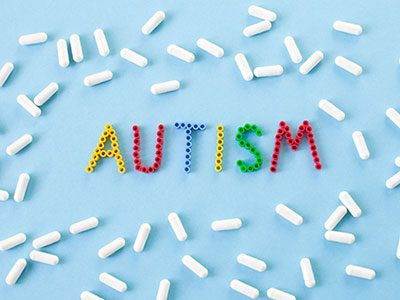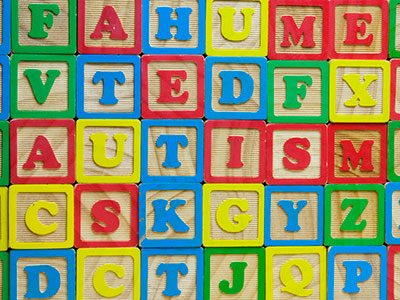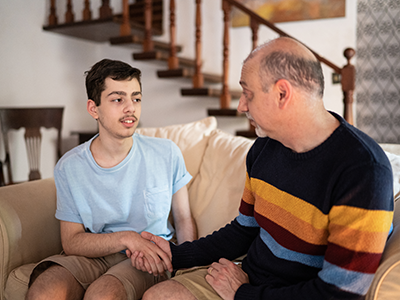Let’s talk about food! It nourishes us, it sustains us, for many, it has cultural and spiritual significance, but unfortunately, for many autistic folks and their families, it’s become a source of tension, misinformation and disagreement. And with the holidays around the corner, it’s a topic on many of our minds!
When we talk about food, I think it’s important to be mindful of the lens through which we look at this conversation — I’m a young, cis-gender, white-presenting woman with a Cuban-American mother and an Irish-American father. In my family growing up, good food was emblematic of both love (Cuba) and wealth (Ireland), so I am biased by being raised with the mentality that restricting or limiting food is unthinkable. But as a young, white-presenting, cis-woman, I also make my own hair gel out of flax seeds so I can understand the arguments of those who want to take a naturalistic approach to caring for their own or their children’s bodies. Finally, above all, I’m a clinical psychologist who is responsible for respecting your viewpoint and culture while doing my utmost to make sure you have the facts you need to make the best decisions for yourselves and your children.
With all that in mind, let’s dive into the information on arguably the most popular dietary program pursued by parents for their autistic children and review the pros and cons.
Before we dive in here, I cannot emphasize enough, ALWAYS talk to your child’s pediatrician or your primary care provider before making radical dietary changes! Food is powerful, and not having appropriate nutrients can do very real damage!
Gluten-free/casein-free (GFCF) diet
This diet is one of the most popular diets trialed by families of autistic folks. A few recent review articles summarize what we know about this diet so far including how it theoretically works, the potential benefits and the potential dangers.
How does the gluten-free/casein-free diet work?
- Known fact: We all have little chemicals, proteins, etc. that float around in our bodies and are supposed to connect to specific places in our bodies to help our bodies do things. Kind of like little boats docking at piers. Once a chemical docks, it tells your body to do things. For example, a chemical or protein might dock on the adrenal glands near the kidneys to tell your body to make epinephrine (the hormone that gives you the rush of energy when you’re in danger). They can also tell your body to do other things like make other proteins, release other hormones or release more chemicals to dock other places.
- Known fact: Gluten and casein make little chemicals called “opioid-like peptides” when our body breaks down wheat and dairy. (Don’t let the word opioid throw you off, this isn’t a pain reliever like morphine — same word, slightly different thing.)
- Known fact: We all have something called the “blood-brain barrier,” a kind of wall that surrounds our brain and stops most of these little chemicals (including opioid-like peptides) from getting into our brain when they’re not supposed to be there.
- Only a theory: Autistic folks have gastrointestinal problems that allow opioid-like peptides from wheat and dairy to leave the digestive tract, enter the bloodstream and eventually cross the blood-brain barrier. Once they’re in the brain area they dock at places that they’re not supposed to be. (This is called the “leaky-gut theory.”)
- Only a theory: When the opioid-like peptides dock at places they aren’t supposed to be, the body does things it isn’t supposed to do, and this creates things like social skills deficits, behavioral problems and repetitive behaviors.
- Only a theory: By limiting the intake of gluten and casein by autistic folks, they’ll be better able to engage socially, participate in things more flexibly and be better able to regulate emotions.
Does the gluten-free/casein-free diet work?
I know it’s not the most helpful answer, but really, we don’t know. Three review articles have tried to round up all the research on this diet and have come to different conclusions.
- Article 1 (written in 2020) says that some studies have reported benefits from this diet (increased attention and social engagement, for example) but all the studies done have been with small groups of people. This matters because when you have only a small group of people in a study you run a higher risk of getting results that don’t apply to most other people, and a higher risk of your results just kind of being a “fluke” or coincidence.
- Article 2 (written in 2021) was the most favorable to this diet and says that overall, this diet seemed to result in improvement in difficult behaviors related to ASD without any significant safety side effects. One thing important to note with this article is that this diet seemed to be more helpful in reducing difficult behaviors in kids with already diagnosed stomach problems or allergies, so we need to consider that they just felt better and more comfortable in their bodies on this diet, and this is what improved behavior.
- Article 3 (written in 2022) was the least favorable. This article basically shared that there’s not enough good evidence to say one way or the other if this diet is helpful because researchers haven’t been using good measurements in their studies. For example, they’ve relied on parents just saying whether they feel like their child is doing better instead of observing the child themselves before and after the diet.
What could go wrong with the gluten-free/casein-free diet?
- The biggest risk with these kinds of elimination diets is the risk that kids won’t get the nutrients they need for their growing and developing bodies. Articles 1 and 2 mention that the biggest concern with this diet is that a calcium deficiency from cutting out dairy will impact the strength of growing kids’ bones. Article 2 reported that there was no evidence suggesting that this diet would result in calcium deficiency, but Article 1 was less optimistic and reported that this could be a significant safety risk. Article 1 also points out that many autistic people have a lot of sensory-based food aversion and there are only so many things that many autistic kids are willing to eat. This leaves families in the bad spot of trying to decide whether to cut out some of the only things their child will eat reliably.
- This is only my opinion, but I believe that in that situation-fed is best! The priority is making sure kids don’t starve, everything else comes after. A full belly is better than “hangry.”
The bottom line is that at the end of the day people have many ways they choose to prepare food for themselves and their families. The priority is making sure no one starves and that everyone has all the nutrients they need so that their bodies function properly. This is why it’s so important to have a doctor or registered dietician on board and sign off on any dietary changes. We also need to keep in mind that many families who might want to try an alternative diet don’t have the means to do so (one of the articles above mentions that the gluten-free/casein-free diet is many times more expensive than doing a non-specialized grocery run).
 https://riseandshine.childrensnational.org/wp-content/uploads/2025/10/autism-image-feature.jpg
300
400
Rise and Shine
https://riseandshine.childrensnational.org/wp-content/uploads/2017/11/childrens_riseandshine_logo.jpg
Rise and Shine2025-10-28 15:41:562025-10-28 15:44:24Understanding autism beyond the headlines
https://riseandshine.childrensnational.org/wp-content/uploads/2025/10/autism-image-feature.jpg
300
400
Rise and Shine
https://riseandshine.childrensnational.org/wp-content/uploads/2017/11/childrens_riseandshine_logo.jpg
Rise and Shine2025-10-28 15:41:562025-10-28 15:44:24Understanding autism beyond the headlines





















Leave a Comment
Want to join the discussion?Feel free to contribute!